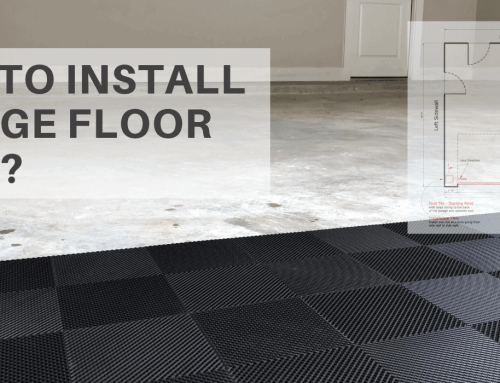These are the two commonly available types of residential garage floor tiles found in the USA market. When it comes to residential garage flooring, both types of tiles have excellent performance and can handle the weight and traffic from a typical residential garage. The following sections will discuss and compare some of the typical advantages for each material type when used in a residential garage environment.
Garage Tile Material
ModuTile manufactures two types of garage floor tiles. One type is comprised of High-impact Polymer; the other type is comprised of Flexible PVC (flexible polyvinyl-chloride).
High-Impact Polymer (more specifically, high-impact polypropylene copolymer): It is a specially formulated high-impact plastic with UV protection. It is lightweight, but strong enough to support large amounts of weight. One of the key benefits of the high-impact polymer material is that not much sticks to it. As a result, it is easy to clean and difficult to stain. Our polymer base garage tiles are odorless and do not release gases during normal use.
Flexible PVC (aka synthetic rubber): The flexible PVC (flexible polyvinyl-chloride) is a special type of PVC that is made to be flexible, yet extremely strong. Consequently, it is often used in commercial flooring applications. Our product is formulated and made in such a way that the tiles feel like rubber. Garage floor tiles comprised of this material may have a certain mild odor when new,but it goes away fairly quickly. We add UV protection to guard against the sun’s UV rays. We also agents so that the tiles will be resistant to mildew and mold.
Garage Tile Rigidity
ModuTile’s high-impact polymer garage floor tiles are considered rigid. They can conform to slightly uneven surfaces due to the way they interlock together. As a rule of thumb, the polymer garage tiles are okay to use with a 1/4 inch variation within a 10 ft. radius.
As the name suggests, the Flexible PVC tiles are flexible and will conform to a subfloor. If the subfloor has dips or small holes, they tiles will conform to it and may make the floor look unpleasant. Because of this flexibility, these tiles must be installed on a rigid surface.
Garage Tile Structure
In reference to the tile thickness, the high-impact polymer tiles have a market standard of 1/2”. The thickness of the Flexible PVC has a market standard of 1/4”. The differences in materials allow for different construction thickness. High-Impact polymer is a rigid material that allows you to construct a grid underneath for air and water flow. In contrast, the Flexible PVC tiles do not allow for an air or water flow grid underneath. Its construction is more of a solid piece.
For some projects, the grid structure of the the high-impact polymer tiles may or may not matter. For example, if you are planning to use the garage on a daily basis and you are driving a vehicle in and out, the polymer tile with a 1/2” grid structure may be more appropriate. The grid underneath will allow moisture to escape from under the tiles. The grid structure does allow for air to circulate. Additionally, the polymer tiles are lighter making them easier to move when doing regular maintenance.
However, if you are converting your garage into a workout room, home gym, pool table room, ping pong room, or car showroom, the flexible PVC tiles may simply be the better option. For these types of projects, water is not an issue, and the added benefits such as anti-fatigue surface, acoustic insulation, and flexibility make them a more suitable choice.
The biggest difference in structure is the availability of a drain or perforated floor tile construction. High-Impact Polymer garage floor tiles can be constructed with perforations on its surface. These perforations allows water to flow or drain right through them. This can be highly beneficial in northern garages that need melted snow to flow to a drain inside the garage. In southern states, rain may be an issue. Drain tiles allow water to flow out of the garage with a properly leveled concrete subfloor. Of course, the solid top surfaces are used widely in both northern states and southern states without issues. Regular maintenance is recommended on all types of garage tiles. The condition of the concrete subfloor should always be taken into consideration when choosing which type of tile is more appropriate to use for your home.
Garage Floor Tile Load Capacity
The Flexible PVC tiles are constructed from a professional grade material that allows extremely heavy loads. When used in a residential garage, the load capacity is not as relevant as both materials will easily support the heaviest vehicle placed on top.
High-Impact Polymer garage floor tiles are designed to support: home furniture (e.g., pool tables, sofas, refrigerators), workshop tables, heavy tool chests, SUVs, large pickup trucks, and cargo vans.
The flexible PVC garage tiles are designed to support: same as the polymer tiles plus moving trucks, forklifts and airplanes.
Please note that pinpoint weights may damage the tiles. Plywood or another protective flat surface should be used when using jacks or other sharp objects. For permanent vehicle lifts, we recommend you to tile around the lift.
Garage Floor Interlocking System
The polymer base garage tiles have a 4 loop-to-peg interlocking system and can interlock with any of our other high-impact polymer interlocking floor tiles. They will not interlock with other tiles manufactured by other companies. Our interlocking system is unique and engineered for high performance and durability.
The Flexible PVC tiles have a 6 loop-to-peg system. This tiles will NOT interlock with the high-impact polymer base tiles or other tiles manufactured by other companies. A great advantage arriving from our interlocking system is that the garage tiles will have a straight edge once interlocked. Our flexible PVC tiles do not have the zigzag or zipper locking system that may look tacky when using multiple colors.
Tile Surface Pattern
High-Impact polymer tiles come in three varieties; Coin Top, Diamond Top and Perforated (drain). The Coin Top and the Diamond Top have a non-slip texture surface. The Perforated tile has a traction surface. Please review images for details.
The Flexible PVC tiles also come in three varieties: CoinTop, DiamondTop, and FlatTop. All three styles have a non-slip textured surface.
Garage Floor Tile Size
The polymer tiles are 12” x 12” x 1/2” and the Flexible PVC tiles are 18” x 18” 1/4”.
In general, a garage floor tile that is 12” x 12” is more flexible when making color designs on residential garages. Making color borders is simply easier because the garage tile is smaller. For more creative garage floor designs, one sq. ft. tiles offer more flexibility. Of course, when working in larger areas such as a 3 or 4 car garage, this advantage is not as prominent. When designing a regular checkerboard pattern garage floor, either tile will work well.
RESISTANT TO MOST HOUSEHOLD CHEMICALS
Both types of tiles resist most chemicals found in your home such as salt, oil, grease, hydraulic fluids. Also, both types of tiles are resistant to hot tires. However, the Flexible PVC floor tiles may become stained by some rubber products such as rubber tires (typically high-performance tires), black soled shoes, rubber casters, chair bottoms, etc.
To review our full section of Garage Floor Tiles please visit the following link: https://modutile.com/garage-floor-tiles/

